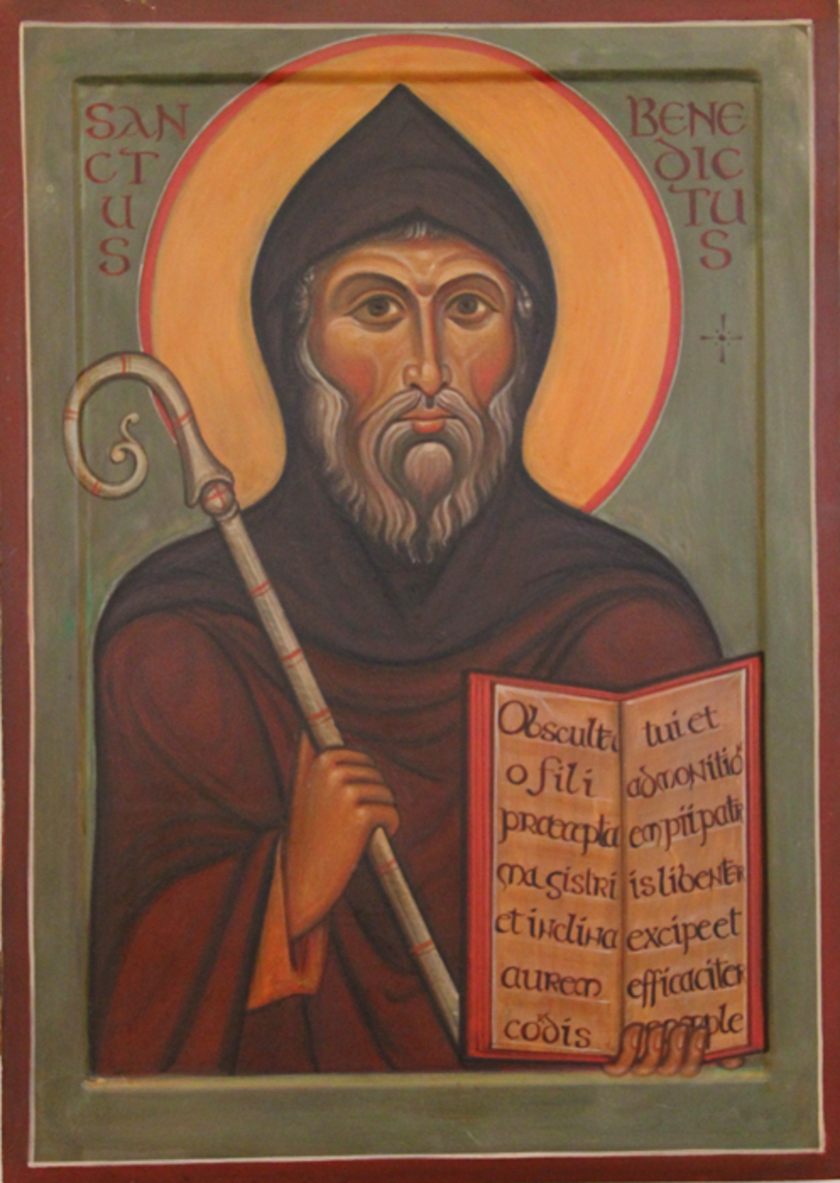To live in a more realistic manner
21. März 2013
Homily for the Transitus of Our Holy Father St. Benedict, 2013 (Abbot Gregory)
 Saint Benedict of Nurcia
Saint Benedict of Nurcia
Transitus
In monastic tradition today’s feast is generally reckoned the greatest of our celebrations of St. Benedict. It is his birth into eternal life, his transitus or passing over from death to life, his journey with Christ out of the shadows of this passing world into the luminous presence of God. The image of his death given us by his biographer Pope St. Gregory the Great offers us an outstanding example of what medieval people called the ars moriendi, “the art of dying well.”
In the oratory of his monastery, fortified by Holy Communion and supported by the hands of his brothers, Benedict gave back his spirit to God. All the important elements of dying well are there: the support of Church and community, and the liturgy, in which Christ comes to nourish us, veiled in sacramental signs.
To keep death daily before our eyes…
Commenting on Benedict’s Rule for Monks, Pope Gregory said that it gives us an insight into the life of this great Saint for he could not have written differently from the way he lived. But it seems to me that Benedict could also not have died as he did, if he had not lived as he did! He can still instruct us therefore, in our day, in this ars moriendi, this art of dying in a way pleasing to God.
In his Rule Benedict advises us “to keep death daily before our eyes.” I think he did not mean that we should be always thinking morbid thoughts or hating the good things of the earth because we are always supposed to be longing for the better things of heaven! That was the accusation of world-denying nihilism which the radical atheist philosopher Nietzsche brought – and not without justice! - against the gloomy Christians of his day. But, actually, the ancient philosophers, both Greek and Latin, would have agreed with Saint Benedict. For them, the most authentic philosophy – to which in the world of Late Antiquity the monastic life succeeded - is always a daily preparation for death. I think what they and the early monks meant by that is really very simple.
Gelassenheit
To become aware that there is an end not just to life in general but to my life, to realize that I am not eternal, that I do not go on forever, is to begin to live realistically and authentically. By keeping my focus fixed on the true goal of life - union with God, already in this passing world – I can start to cultivate a new attitude: one of letting go, what the German medieval mystics called Gelassenheit.
By recognizing the radical relativity of everything – the fact that all things change and pass away, and that I am passing with them - I learn not to grasp at people, places and things, not to turn them into objects. I learn to release my strangulating grip and gradually to let go – not clinging, in the end, even to life itself. Actually, another Benedict, in a magnificent act of Gelassenheit has recently shown us this wisdom of letting go – perhaps the most important act of his Petrine ministry.
To live in a more realistic manner
To In the Psalms we sing, “Make us know the shortness of our life that we may gain wisdom of heart.” Such wisdom comes when I see that God alone is eternal and unchanging and that only in union with him is there true and lasting happiness. St. Benedict died as he lived. So too, death will never catch us unawares if we learn to await his arrival and welcome him when he comes. A Christian knows that death is never ultimate for Christ is truly risen.
In union with St. Benedict, and with the Holy Mother of God here in this place of her Dormition, but above all in union with Our Lord Jesus Christ who prayed, dying on the cross, “Into your hands O Lord, I commend my spirit,” let us release our grip a little on this life and live in a more realistic manner, more aware of our mortality. Then when death finally come, like our Holy Father St. Benedict, we shall not resist him as an enemy but greet him as a friend - as one who leads us out of the shadows into God’s eternal light.
Amen.